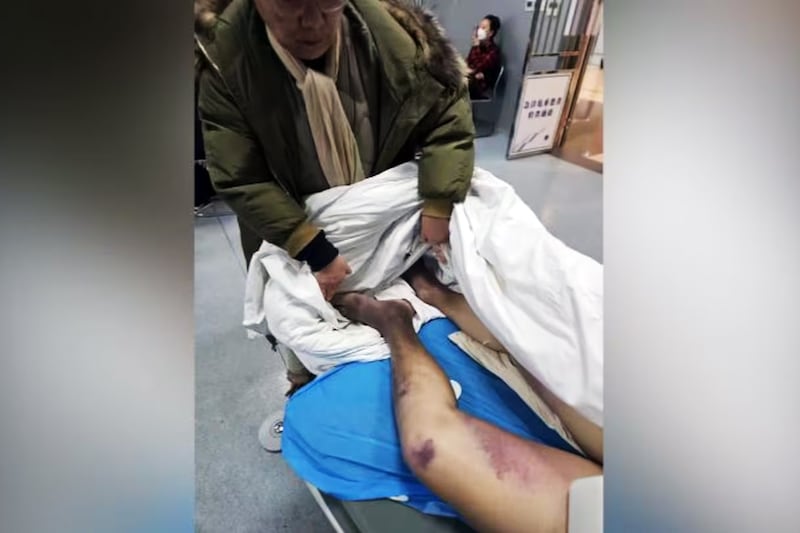Ethnic Mongolian dissident and Nobel Peace Prize nominee Hada is in the hospital in China’s northern region of Inner Mongolia after being rushed there for emergency treatment while under house arrest, Radio Free Asia has learned.
Hada, 69, was admitted to the Affiliated Hospital of Inner Mongolia Medical University on Jan. 25, where he spent some time in a critical condition, his wife Xinna told RFA on Monday. 3. Both Hada and Xinna go by a single name.
The news emerged as Hada was nominated for the 2025 Nobel Peace Prize by Japanese lawmakers last month, who cited his continuing advocacy for his people living under Chinese Communist Party rule despite years of persecution.
State security police, who are supervising Hada’s house arrest in Inner Mongolia’s regional capital Hohhot, contacted his son Uiles, Xinna said.
“When we rushed to the hospital at 2 p.m., Hada was in the emergency room on a ventilator, and his condition was very serious,” she said. “All of his organs were starting to fail.”
“The hospital showed Uiles a notice of critical illness, but wouldn’t allow him to take photos,” Xinna said.
Hada had been rushed in after suffering from fecal incontinence at home, and had received a blood transfusion at the hospital, she said.
RELATED STORIES
Ethnic Mongolian dissident Hada gets Nobel Peace Prize nomination
China recruits Mandarin-speaking teachers to move to Inner Mongolia
Digger plows into grasslands protesters in China, injuring ethnic Mongolian herder
Xinna, who was later allowed to take photos, shared photos of Hada, no longer intubated, wearing a respirator and on a drip in the intensive care unit.
She also photographed multiple bruises down his left leg.
Hada wasn’t out of danger until Jan. 31, and didn’t come off the ventilator until Feb. 2.
He remains under police escort on the ward.
Police surveillance
Xinna said the couple was unable to afford the 10,000 yuan (US$1,300) daily cost of his hospital care, but that the police had eventually agreed to meet the cost.
She said police have been holding Hada under house arrest at a residential compound in the northern suburbs of Hohhot, with a round-the-clock security detail.
“Hada has been imprisoned for 30 years now; his body and mind have been severely damaged, and now his life is in danger,” Xinna said. “I and my son have both spoken the truth, but we have both been framed, imprisoned and sentenced.”

Xinna said she remains under police surveillance, and has to live separately from her husband.
“The police have also moved into my residential building and monitor us all year round, so my whole family has also lost their freedom,” she told RFA Mandarin.
“The endless persecution of Hada and our family by the Chinese Communist Party is a picture of the tragic human rights situation in Inner Mongolia in microcosm,” Xinna said.
“I call on the international community to pay more attention to this, and to condemn it.”
Xinna called on Beijing to immediately lift its surveillance of her family, but thanked the hospital staff for their treatment of her husband.
U.S.-based ethnic Mongolian activist Enghebatu Togochog said the authorities have been neglected Hada’s medical needs while under house arrest.
“He’s in a very poor state of health, he hasn’t been getting proper treatment, and Xinna isn’t allowed to see him,” he told RFA Mandarin in an interview on Feb. 3.
“The deterioration in Hada’s physical health is linked to his long-term detention by the authorities.”
Activism
Hada, who was incarcerated for 19 years for his activism on behalf of ethnic Mongolian herding communities, remains under house arrest in the regional capital Hohhot.
His wife Xinna has also helped an unknown number of ethnic Mongolian herders petition the authorities and find lawyers to fight their claims to their traditional grazing lands that are increasingly being taken over by Han Chinese migrants or state-owned companies.
Hada was released from extrajudicial detention in December 2014, four years after his 15-year jail term for “separatism” and “espionage” ended, but he has remained under close police surveillance and numerous restrictions, including a travel ban and frozen bank accounts.
Hada has taken issue with his alleged “confession,” to the charges, saying that it was obtained under torture and after being given unidentified drugs.
He has also said he expects to stay locked up for as long as the ruling Chinese Communist Party remains in power.
Translated by Luisetta Mudie. Edited by Roseanne Gerin.
